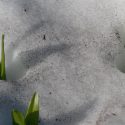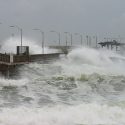Poll: Many state anglers unaware of laws to prevent spread of invasive species
Many anglers in Wisconsin are unaware of laws designed to prevent the spread of aquatic invasive species and protect the state’s lakes and rivers, according to a recent statewide poll.
Anglers had the most confusion about laws designed to stop the fish disease viral hemorrhagic septicemia (VHS) from spreading between lakes and other bodies of water in the state.
VHS, which was first detected in Wisconsin waters in 2007, can infect up to 45 different fish species and cause large-scale fish kills. It is transmitted through the body fluids of fish, including urine and blood. It travels with fish or the water fish have been in and can survive for years in fish or days in the water.
Only 31 percent of anglers were aware that it’s illegal to leave a boat landing with any live fish other than bait purchased from a Wisconsin bait dealer or fish farm. This law was enacted to prevent people from accidentally or intentionally transferring fish from one water body to another.
“Moving fish from one lake to another may be well-intended to improve fishing in the second body of water, but it’s against the law because it increases the likelihood of spreading VHS, which is something nobody wants,” says Bret Shaw, environmental communication specialist for the University of Wisconsin-Extension and principal investigator on the study.
There was mixed awareness about laws when fishing with minnows. More than 90 percent knew that it’s illegal to release minnows in Wisconsin waterways, and more than 80 percent knew it is not legal to use leftover minnows on another water body if lake or river water or fish were added to the bait container. This restriction prevents mixing in potentially contaminated water or fish.
But many anglers were also not aware that they can use leftover minnows bought from Wisconsin bait dealers or fish farms on the same water even if they’ve added lake or river water or fish to their bait container. This is allowed because it does not have the risk of spreading contaminated water or fish from one water body to another.
Another area of concern was that 28 percent of anglers did not know it was illegal to leave a boat landing with any water onboard a boat or in equipment with the exception of drinking water and up to two gallons of water in a bait container holding leftover minnows.
On the other hand, anglers were well aware of some of the state’s boating laws designed to prevent the spread of aquatic invasive species in Wisconsin’s lakes and fisheries, suggesting they have been paying attention to nearly two decades of outreach campaigns to educate the public about behaviors to prevent the spread of aquatic invasive species and VHS. For example, 94 percent of anglers knew that it is illegal to launch a boat or trailer with plants or animals attached, and a similarly high 91 percent knew that it’s illegal to leave a boat landing with plants or animals attached.
“We will be working with partners throughout the state to help shape outreach efforts to prevent the spread of the VHS fish disease and aquatic invasive species,” says Dominique Brossard, co-investigator on the study and associate professor in the Department of Life Sciences Communication at UW–Madison.
Brossard and Shaw have been working closely with the state Department of Natural Resources, UW-Extension and the UW–Madison Sea Grant on research related to outreach efforts.
“We need to protect our natural resources and all citizens have a role to play,” Brossard says.
The survey was conducted as part of UW–Madison’s Badger Poll of 507 people randomly chosen within households with working landlines in October and November. Results from this survey have a margin of error of a little more than plus or minus 4 percent. The survey was fielded in partnership with the Department of Life Sciences Communication at UW–Madison, UW-Extension and the state Department of Natural Resources.
Subscribe to Wisconsin Ideas
Want more stories of the Wisconsin Idea in action? Sign-up for our monthly e-newsletter highlighting how Badgers are taking their education and research beyond the boundaries of the classroom to improve lives.
Tags: environment, research, The Wisconsin Idea



